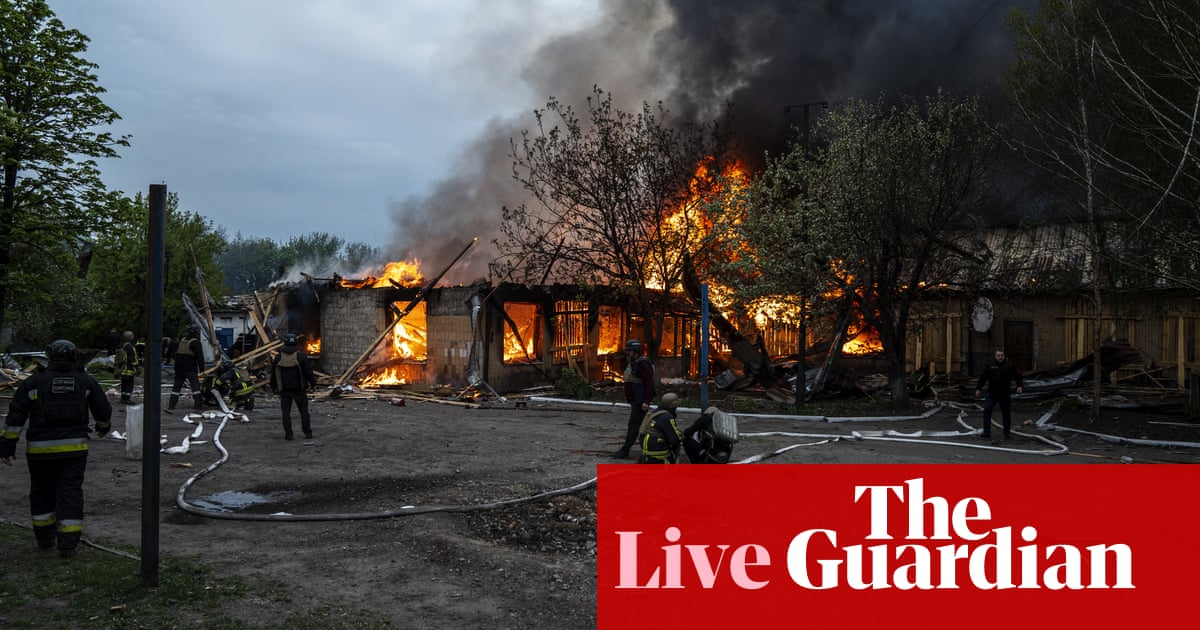US and Ukraine sign reconstruction investment fund

Andrew Roth
The US and Ukraine have signed an agreement to share revenues from the future sale of Ukrainian minerals and rare earths, sealing a deal that President Donald Trump has suggested will provide an economic incentive for the US to continue to invest in Ukraine’s defense and its reconstruction after a future peace deal with Russia.
The minerals deal, which has been the subject of tense negotiations for months, will establish a United States-Ukraine Reconstruction Investment Fund that the Trump administration has said will help repay an estimated $175 billion in aid provided to Ukraine since the beginning of the war.
“This agreement signals clearly to Russia that the Trump Administration is committed to a peace process centered on a free, sovereign, and prosperous Ukraine over the long term,” said treasury secretary Scott Bessent. He continued:
President Trump envisioned this partnership between the American people and the Ukrainian people to show both sides’ commitment to lasting peace and prosperity in Ukraine. And to be clear, no state or person who financed or supplied the Russian war machine will be allowed to benefit from the reconstruction of Ukraine.
Critics of the deal have said that the White House has taken advantage of Ukraine by linking military aid against the Russian invasion to a firesale of critical minerals and rare earths.
Ukraine’s first deputy prime minister Yulia Svyrydenko confirmed that she had signed the agreement on Wednesday. In a post on X she wrote:
Together with the United States, we are creating the fund that will attract global investment into our country.
Key events
What critical minerals does Ukraine have?

Damien Gayle
A 2022 article by the chair of Ukraine’s Association of Geologists, Hanna Liventseva, claimed her country contained about 5% of the world’s mineral resources, despite covering only 0.4% of the globe’s surface, thanks to a complex geology that takes in all three of the main components of the earth’s crust.
According to Ukraine’s own data, cited by Reuters, the country has deposits of 22 of the 34 minerals identified as critical by the EU, including rare earths such as lanthanum, cerium, neodymium, erbium and yttrium.
Before the outbreak of war with Russia, Ukraine was a key supplier of titanium, producing about 7% of global output in 2019, according to European Commission research, as well as manganese. It also claimed about 500,000 tonnes of lithium reserves, the largest in Europe, and one-fifth of the world’s graphite, a crucial component of nuclear power stations.
However, with Russia controlling about one-fifth of Ukraine’s territory, a lot of these reserves have been lost.
According to estimates by Ukrainian thinktanks cited by Reuters, up to 40% of Ukraine’s metal resources are in land under occupation. Russian troops also hold at least two of Ukraine’s lithium deposits, one in Donetsk and another in Zaporizhzhia.
What are critical minerals?

Damien Gayle
Critical minerals are the metals and other raw materials needed for the production of hi-tech products, particularly those associated with the green energy transition, but also consumer electronics, artificial intelligence infrastructure, and weapons.
The rush to tackle climate breakdown and move away from fossil fuels has triggered a scramble for energy transition minerals such as cobalt, copper, lithium and nickel, which are useful for the electrification of transport and the construction of wind turbines.
The same minerals and others are also used for the manufacture of mobile phones, AI datacentres and military assets such as F-35 fighter aircraft, placing them in high demand.
As the world’s economy and technology transforms, the value of critical minerals has soared and geopolitical competition for access to them is rising.
In 2023, the International Energy Agency (IEA) estimated that the market for energy transition minerals had reached £320bn in 2022, double its value five years earlier. And if countries fully implement their clean energy and climate pledges, demand is expected to more than double by 2030 and triple by 2040, the agency says.
The deal has been a source of great friction between the US and Ukraine, including a disastrous February meeting between Donald Trump and Volodymyr Zelenskyy in which Trump and his vice-president, JD Vance, shouted at the Ukrainian leader in front of live TV cameras.
Ahead of the meeting Zelenskyy had alleged the US was pressuring him to sign over more than $500bn (£395bn) in mineral wealth – about four times what the US has contributed to Kyiv since the start of the war and which Zelenskyy had said would take 10 generations of Ukrainians to pay back.
Trump has also pressed Ukraine to accept territorial concessions to Russia in a peace agreement with Russia, including Crimea. Zelenskyy has insisted the Black Sea peninsula is an integral part of his country.
In Kyiv, prime minister Denys Shmygal said on national television that the agreement was “good, equal and beneficial”, AFP reports.
Here’s our full report on the deal, by Andrew Roth and Shaun Walker:
The US and Kyiv have signed an agreement to share revenues from the future sale of Ukrainian minerals and rare earths, sealing a deal that Donald Trump has said will provide an economic incentive for the US to continue to invest in Ukraine’s defense and its reconstruction after he brokers a peace deal with Russia.
The minerals deal, which has been the subject of tense negotiations for months and nearly fell through hours before it was signed, will establish a United States-Ukraine Reconstruction Investment Fund that the Trump administration has said will begin to repay an estimated $175bn in aid provided to Ukraine since the beginning of the war.
“This agreement signals clearly to Russia that the Trump Administration is committed to a peace process centered on a free, sovereign, and prosperous Ukraine over the long term,” said Scott Bessent, the US treasury secretary, in a statement.
“President Trump envisioned this partnership between the American people and the Ukrainian people to show both sides’ commitment to lasting peace and prosperity in Ukraine. And to be clear, no state or person who financed or supplied the Russian war machine will be allowed to benefit from the reconstruction of Ukraine.”
Ukraine’s first deputy prime minister, Yulia Svyrydenko, confirmed in a social media post that she had signed the agreement on Wednesday.
“Together with the United States, we are creating the fund that will attract global investment into our country,” she wrote.
In a post on Facebook, Ukraine’s first deputy prime minister Yulia Svyrydenko gave further details of the fund, which she said would “attract global investment”.
She confirmed that Ukraine would retain full ownership of resources “on our territory and in territorial waters belong to Ukraine.”
“It is the Ukrainian state that determines where and what to extract,” she said.
There would be no changes to ownership of state-owned companies, she said, “they will continue to belong to Ukraine”. That included companies like Ukrnafta, Ukraine’s largest oil producer, and nuclear energy producer Energoatom.
Income would come from new licences for critical materials and oil and gas projects, not from projects which had already begun, she said.
Income and contributions to the fund would not be taxed in the US or Ukraine, she said, “to make investments yield the greatest results”.
In a post on Telegram, Ukraine’s prime minister Denys Shmyhal said that the two countries would establish a Reconstruction Investment Fund with each side having 50% voting rights.
“Ukraine retains full control over its subsoil, infrastructure and natural resources,” he said.
Meeting a key concern for Kyiv, he said Ukraine would not be asked to pay back any “debt” for the billions of dollars in US weapons and other support since Russia invaded in February 2022.
He also said the fund would not be an obstacle to Ukraine’s EU accession talks.
“The fund’s profits will be reinvested exclusively in Ukraine,” he said, adding:
Thanks to this agreement, we will be able to attract significant resources for reconstruction, start economic growth, and receive the latest technologies from partners and a strategic investor in the United States.
A draft of the deal seen by Reuters news agency says it would give Washington preferential access to new Ukrainian natural resources deals.
However it did not automatically hand Washington a share of Ukraine’s mineral wealth or any of its gas infrastructure.
It provided for creation of a joint US-Ukrainian fund for reconstruction which will receive 50% of profits and royalties accruing to the Ukrainian state from new natural resources permits in Ukraine.
US and Ukraine sign reconstruction investment fund

Andrew Roth
The US and Ukraine have signed an agreement to share revenues from the future sale of Ukrainian minerals and rare earths, sealing a deal that President Donald Trump has suggested will provide an economic incentive for the US to continue to invest in Ukraine’s defense and its reconstruction after a future peace deal with Russia.
The minerals deal, which has been the subject of tense negotiations for months, will establish a United States-Ukraine Reconstruction Investment Fund that the Trump administration has said will help repay an estimated $175 billion in aid provided to Ukraine since the beginning of the war.
“This agreement signals clearly to Russia that the Trump Administration is committed to a peace process centered on a free, sovereign, and prosperous Ukraine over the long term,” said treasury secretary Scott Bessent. He continued:
President Trump envisioned this partnership between the American people and the Ukrainian people to show both sides’ commitment to lasting peace and prosperity in Ukraine. And to be clear, no state or person who financed or supplied the Russian war machine will be allowed to benefit from the reconstruction of Ukraine.
Critics of the deal have said that the White House has taken advantage of Ukraine by linking military aid against the Russian invasion to a firesale of critical minerals and rare earths.
Ukraine’s first deputy prime minister Yulia Svyrydenko confirmed that she had signed the agreement on Wednesday. In a post on X she wrote:
Together with the United States, we are creating the fund that will attract global investment into our country.
Summary of the day so far
It’s 10.15pm in Kyiv and Moscow, and 3.15pm in Washington. Here’s a recap of the latest developments:
-
Ukraine and the US said they were ready to sign a minerals deal, amid reports that a last-minute obstacle injected uncertainty into the timing. “Our side is ready to sign. The Ukrainians decided last night to make some last-minute changes,” US treasury secretary Scott Bessent told reporters. “We’re sure that they will reconsider that and we are ready, if they are.”
-
Ukraine’s first deputy prime minister, Yulia Svyrydenko, is on her way to the US to sign the minerals deal, according to a senior source in the Ukrainian presidency. Ukraine’s prime minister, Denis Shmyhal, said on Wednesday that the reworked deal would be signed within the next 24 hours and would have to be ratified by the Ukrainian parliament. But later reports claimed the US was pushing Ukraine to sign additional documents, but that Kyiv felt they were not ready yet.
-
Vladimir Putin said some small groups of Ukrainian soldiers were still holed up in basements and hideouts in Russia’s western Kursk region. Speaking at an event in Moscow on Wednesday, the Russian leader said radio intercepts suggested that the few Ukrainians left behind were asking commanders to urgently evacuate them to safety.
-
The EU is preparing a “plan B” on how to keep economic sanctions against Russia should the US abandon Ukraine peace talks and seek rapprochement with Moscow, according to the bloc’s top diplomat, Kaja Kallas. “We see signs that they are contemplating whether they should leave Ukraine and not try to get a deal with the Russians because it’s hard,” Kallas told the Financial Times.
-
Russia and North Korea have begun construction of a road bridge between the two countries as part of an effort to strengthen their strategic partnership, Russia’s prime minister, Mikhail Mishustin, said. It comes after South Korean lawmakers said about 600 North Korean troops have been killed fighting for Russia against Ukraine.
Volodymyr Zelenskyy and Canada’s prime minister, Mark Carney, held a call on Wednesday during which the Ukrainian leader congratulated Carney on his victory in the Canadian federal elections on Monday.
Zelenskyy, in a post on X, said he and Carney discussed steps that could “bring us closer to a full, unconditional ceasefire and a dignified peace.”
We also talked about the prospects of Canada’s G7 presidency this year and our cooperation within the Coalition of the Willing. We are preparing various formats of cooperation in the near future.
“Thank you, Canada, for your support. We are counting on effective cooperation,” Zelenskyy added.
The EU is preparing a “plan B” on how to keep economic sanctions against Russia should the US abandon Ukraine peace talks and seek rapprochement with Moscow.
Kaja Kallas, the EU’s high representative for foreign and security policy, told the Financial Times:
We see signs that they are contemplating whether they should leave Ukraine and not try to get a deal with the Russians because it’s hard.
Kallas said there was a “plan B” to maintain economic pressure on Russia should Hungary block the rollover of EU economic sanctions in July. She stressed that Brussels was still focused on keeping all EU member states aligned.
There is also a plan B but we have to work for plan A; because otherwise you concentrate on plan B and then that will happen.
Here’s more on the reported “last-minute hurdles” that appeared amid reports that Ukraine and the US were poised to sign a minerals deal.
As we reported earlier, Ukraine’s first deputy prime minister Yulia Svyrydenko was due to be in Washington on Wednesday to sign the deal.
But a source told Reuters that the US was pushing Ukraine to sign two additional documents as well as the main minerals deal.
The Trump administration urged Ukraine to sign all three documents connected to the deal, but Kyiv felt they were not ready yet, Politico reported. A source told the outlet:
All three documents need to be signed today, but the Ukrainians are trying to reopen terms which have already been agreed upon as part of the package — this will be up to the Ukrainians, as the US is ready to sign.
The US told Svyrydenko not to travel to Washington on Wednesday unless the agreements were finalised, according to the outlet.
US says it is ‘ready to sign’ minerals deal ‘this afternoon’
US treasury secretary Scott Bessent said Washington is “ready to sign” a minerals deal with Ukraine.
At a cabinet meeting at the White House, Donald Trump was asked by a reporter about the deal, which he then directed to Bessent.
“Our side is ready to sign,” Bessent said, adding that the Ukrainians had “decided last night to make some last-minute changes”. He added:
We’re sure they will reconsider that, and we are ready to sign the afternoon.
Bessent said “nothing has been removed” from the agreement.
It’s the same agreement that we agreed to on the weekend. No changes on our side.
The announcement of the construction of a new road bridge connecting Russia and North Korea comes after reports that about 600 North Korean troops have been killed fighting for Russia against Ukraine.
North Korea has suffered about 4,700 casualties so far, including injuries and deaths, out of a total deployment of 15,000, South Korean lawmakers said on Wednesday, citing the country’s intelligence agency.
In return for dispatching troops and supplying weapons to Russia, North Korea appears to have received technical assistance on spy satellites, as well as drones and anti-air missiles, they said.
Lee Seong-kweun, a member of the parliamentary intelligence committee, told reporters:
After six months of participation in the war, the North Korean military has become less inept, and its combat capability has significantly improved as it becomes accustomed to using new weapons such as drones.
On Monday, North Korea confirmed for the first time that it had sent troops to fight for Russia in the war in Ukraine under orders from its leader, Kim Jong-un.
Russia and North Korea have begun construction of a road bridge between the two countries as part of an effort to strengthen their strategic partnership, Russia’s prime minister, Mikhail Mishustin, said.
Mishustin announced work had started on the bridge across the Tumnen river while in a video meeting with the chair of North Korea’s Supreme People’s Assembly, Pak Thae-song, on Wednesday.
“This is a truly a milestone for Russian-Korean relations,” Mishustin said.
It symbolises our common desire to strengthen friendly, good-neighbourly relations and increase inter-regional cooperation.
The bridge is being built near the existing “Friendship Bridge”, a rail bridge which was commissioned in 1959 after the Korean war.
Pak was quoted as saying:
It will become an eternal historical memorial structure symbolising the unbreakable Korean-Russian friendly relations.
Putin says a small number of Ukrainian troops are still holed up in Russia’s Kursk region
Russian president Vladimir Putin said on Wednesday that some small groups of Ukrainian soldiers were still holed up in basements and hideouts in Russia’s western Kursk region.
Putin earlier this week phoned his top commanders in Kursk to congratulate them on “victory” and the end of their operation to expel Ukrainian forces from the region after a Ukrainian force stormed across the border last August, Reuters reported.
Speaking at an event in Moscow, Putin said radio intercepts suggested that the few Ukrainians left behind were asking commanders to urgently evacuate them to safety.
Ukraine has said that some of its forces are still inside Kursk and in Russia’s nearby Belgorod region.
Russian president Vladimir Putin said on Wednesday that he had no doubt that Moscow would sooner or later repair its relations with European countries.
Speaking at a forum in Moscow, Putin said many in Europe share Russia’s position on certain issues.

